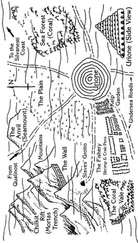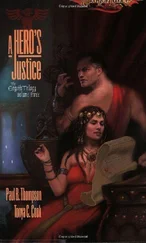The wind had gone, but the black cloud remained and was spreading across the open sky like a curtain falling over a vast stage. Summer day was swallowed up by summer evening. The unnatural twilight brought with it an ominous silence even more complete than usual for the Silent Vale. One of the bearers asked the Speaker what was happening. Gilthas admitted he did not know.
“We must find the holy lady. She can tell us what is going on.” Although he spoke with conviction, in truth Gilthas feared Sa’ida knew no more than they.
Before the bearers could sort themselves out and lift the palanquin, the elf nation came streaming back to camp. Hamaramis arrived with Sa’ida mounted behind him. The old general looked sheepish.
“False alarm, sire!”
Gilthas wasn’t so certain. As he’d suspected, the priestess could add little to what they already knew. A great conjuration was under way. Sa’ida had never seen its like before, but Faeterus obviously meant them harm.
“Are we sure of that?” Gilthas asked.
“No one performs a working this enormous for gentle reasons,” was her grim reply.
Hamaramis dismounted and helped the priestess down. In a low voice, he asked his king whether they should evacuate.
“Where to, General?” Gilthas asked.
Gesturing broadly south, Hamaramis said, “Anywhere outside this valley.”
Gilthas shook his head. It would require days for the thousands of elves to move out of Inath-Wakenti, even if they had someplace to go, which they did not. And there was no guarantee distance would offer safety from Faeterus’s evil design.
The priestess left the two elves. She would retire to her tent, she said, to give serious thought to what she might do to help. If nothing else, perhaps she could tear holes in the black cloud. Sunlight might spoil Faeterus’s plans.
Before departing, she examined the Speaker. His fever had risen, and he was coughing flecks of blood. He did not dispute her insistence that he must rest, but merely said he would be sure to do so when the sun shone again and his people were safe.
The elves returned to their improvised homes. Attempts were made to lift flagging spirits. Fires were kindled to ward off darkness and the chill. Flutes appeared and long-hoarded bottles of nectar and Khurish fluq were passed around. Songs were sung and salutes offered.
Hamaramis took a gloomy view of the merriment, but Gilthas did not. He called for his steward. He intended to go among his people and didn’t wish to go empty-handed. Once his few potables were brought, he set his bearers in motion. With the dour general riding alongside, the Speaker made the rounds of the camp. He hailed everyone he saw, as many by name as he knew, and drank salutes with any who desired it. If his subjects were drinking fine Silvanesti nectar, then he did too. If they had nothing but raw fluq, then the Speaker of the Sun and Stars raised a cup brimming with Khurish liquor. Not by the smallest flicker of expression did he betray his great dislike of fluq.
While the brave celebrations proceeded, Sa’ida repaired alone to her tent. She had come to the forsaken valley as much to discomfort her enemies in Khuri-Khan as to aid the laddad. The laddad khan’s courage and gallant manner had won her over, and she gladly applied her healing art to him. But she was well and truly frightened. Although a priestess of long and honorable service to her goddess, Sa’ida had no skill for high magic such as Faeterus commanded. Her awareness of the ancient power in the valley required no especial skill, only sensitivity. She wore a brave face for the laddad, but in the solitude of her tent, she let go of pretense. Her heart raced, her hands shook, and sweat soaked her white robe.
And yet she would not let fear keep her from doing what she could. Settling as comfortably as she could on the borrowed carpet, she composed her mind and set herself free of her body with a far-seeing spell. Her naes (the Khurish word for soul, or a person’s captive spirit) rose high above the laddad camp. From that vantage point, the movement of the black cloud was plain. The vast mass wasn’t merely thinning and expanding to cover more area, it was turning slowly on a central axis sited directly over the valley’s geographical heart. The rotation was antisunwise, to Sa’ida a sign of negative power. She willed herself to move toward it, but her naes could not pass through the cloud. She made a second attempt and the reaction was violent. Instead of merely being halted, she was hurled back to her body. She arrived with such force, her body was thrown backward. It struck the side of the tent, knocking a support loose and collapsing half the structure. As she lay, gasping for breath, laughter sounded in the darkness.
“Woman, you cannot trifle with me!”
Sa’ida struggled to sit up. “Faeterus! What are you after here?”
“What every practitioner of our art wants: power! When I have it, the first to feel my wrath will be the spawn of those who condemned me. And after I’ve dealt with the elves, I shall turn to you desert-dwelling vermin.”
Sa’ida lifted her hand to the Eye of Elir-Sana. It was a simple gesture, meant to shield the goddess’s image from Faeterus’s blasphemous presence, but contact with the jewel sent a surge of new strength through her. She concealed it, maintaining her pose of cowed weakness.
“Why do you hate the laddad?” she asked carefully. “You are one yourself.”
“I am not!” Although the shout echoed like thunder, she knew no one else could hear it. Faeterus’s voice was meant for her alone. “Chance gave me their form, but I am not of their cursed race!”
“What race are you, then?”
A figure took shape in the darkness. Faeterus allowed his naes to reveal his true form, without the disguise of his heavy robes. Sa’ida’s hand tightened convulsively around the amulet.
“Begone,” she gasped. “Go back to whatever dark place spawned you!”
Faeterus laughed. His phantom hand reached out and grasped Sa’ida’s wrist. When he raised his arm, he pulled her naes out. Her physical body went limp.
“You will witness my triumph. It will be most instructive!”
With a speed that left Sa’ida breathless, they soared above the laddad camp, rising—far higher than Sa’ida had done alone, then they rushed eastward. In seconds they were at a broad shelf cut into the side of Mount Rakaris, which Faeterus called the Stair of Distant Vision.
Her spirit form went sprawling as he abruptly released her. He lifted a hand, and immediately it was filled with a spear. Rather than an actual, physical weapon, the spear was the representation of a spell. He drove it through her thigh, pinning her in place, and the shock of the spiritual impalement drew an involuntary scream. But pain was a force Sa’ida understood. She conquered her agony quickly although she could not free her naes. She remained firmly anchored to the stone.
None of this was visible to Favaronas. From his place at the edge of the Stair, all he saw was the sorcerer standing rigidly by the center pinnacle, head bowed. Abruptly, Faeterus lifted his face and arms to the darkened sky and broke his long silence, declaiming in a loud, clear voice. The language was Old Elvish, and Favaronas recognized the rhyme scheme and meter as an ancient bardic recitation called a houmrya. He had never heard it spoken before. The poetry was said to have erratic, uncontrollable magical effects, and Speaker of the Stars Sithel had banned it long, long ago.
Because Favaronas was an accomplished scholar, be detected the changes Faeterus was making in the houmrya. Faeterus declared himself “breaker of worlds,” when the actual houmrya line was “maker of worlds.” With such twists, he was transforming an ancient poem of creation into an evocation of destruction.
Читать дальше











